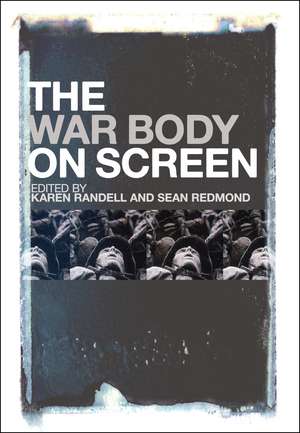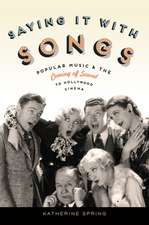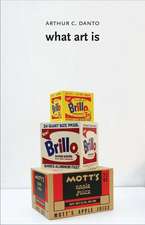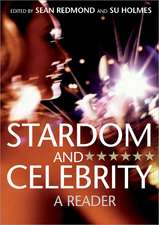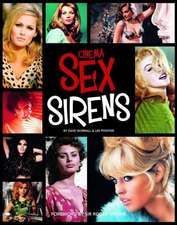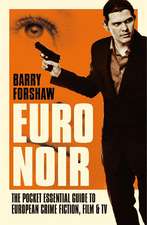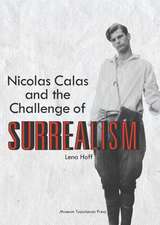The War Body on Screen
Editat de PhD Karen Randell, Sean Redmonden Limba Engleză Paperback – 23 mai 2012
Preț: 272.97 lei
Preț vechi: 349.34 lei
-22% Nou
Puncte Express: 409
Preț estimativ în valută:
52.25€ • 56.77$ • 43.92£
52.25€ • 56.77$ • 43.92£
Carte tipărită la comandă
Livrare economică 21 aprilie-05 mai
Preluare comenzi: 021 569.72.76
Specificații
ISBN-13: 9781441161857
ISBN-10: 1441161856
Pagini: 288
Ilustrații: 10
Dimensiuni: 150 x 226 x 18 mm
Greutate: 0.48 kg
Editura: Bloomsbury Publishing
Colecția Continuum
Locul publicării:New York, United States
ISBN-10: 1441161856
Pagini: 288
Ilustrații: 10
Dimensiuni: 150 x 226 x 18 mm
Greutate: 0.48 kg
Editura: Bloomsbury Publishing
Colecția Continuum
Locul publicării:New York, United States
Caracteristici
The recent 10th anniversary of 9/11 is showing a surge in our war-related titles.
Notă biografică
Karen Randell is Deputy Dean of Arts and Humanities and Associate Professor of Film and Culture at Nottingham Trent University, UK. She is published on trauma in film in Art in the Age of Terrorism (2005) and in SCREEN. She is co-editor of Screen Methods: Comparative Readings in Film Studies (2005) with Jacqueline Furby.Sean Redmond is Associate Professor at Deakin University in Melbourne, Australia. He is the author of The Culture of Blood, and editor of Liquid Metal: The Science Fiction Film Reader.
Cuprins
AcknowledgmentsContributorsIntroduction: Setting the ScreenKaren Randell and Sean RedmondPart One The War Body on ScreenIntroduction to Part OneSean Redmond1. When Planes Fall Out of the Sky: The War Body on ScreenSean Redmond2. The War Body as Screen of TerrorRenuka Gusain3. A King(dom) for a Stage: The War Body in and as PerformanceMatthew Wagner4. Baghdad ER: Subverting the Mythic Gaze upon the Wounded and the DeadLinda RobertsonPart Two The Body of the SoldierIntroduction to Part TwoKaren Randell5. They Came Back: War and Changing National IdentityAdele Parker6. Bleeding Bodies and Post-Cold War Politics: Saving Private Ryan and the Gender of VulnerabilitySarah Hagelin7. "Welcome to Hell, Private Shakespeare": Trench Horror, Deathwatch, and the Resignification of World War IKaren Randell8. One Nation Invisible: Unveiling the Hidden War Body on ScreenH. Louise Davis and Jeffrey JohnsonPart Three The Body of the TerroristIntroduction to Part ThreeSean Redmond9. Constructing the Terrorist Subject: Michael Collins and The Terrorist as Models of Agonistic PluralismJennie Carlsten10. When the Script Runs Out, . . .What Happens to the Polarized War Body? Deconstructing Western 24/7 News Coverage of Operation Iraqi Freedom 2003Vian Bakir and Andrew McStay10. Bodies on the Margins? African America and the War on TerrorPaul Williams12. "Damn You For Making Me Do This": Abu Ghraib, 24, Torture, and Television SadomasochismLindsay ColemanPart Four The Body of the HostageIntroduction to Part FourKaren Randell13. The Kidnapped Body and Precarious Life: Reflections on the Kenneth Bigley CaseHeather Nunn and Anita Biressi14. The Body of the Woman Hostage: Spectacular Bodies and Berlusconi's MediaRinella Cere15. Hostage Videos in the War on TerrorAndrew HillAfterwordJoanna BourkeIndex
Recenzii
The War Body on Screen is a breathtaking exploration of terror and pain in the modern world. Its passionate engagement with the big issues of our time and its intellectual rigour make it indispensable reading. - Joanna Bourke, Professor of History, Birkbeck College
